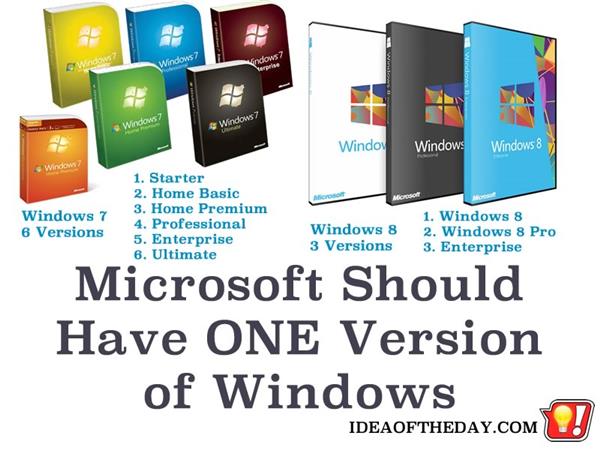Microsoft Should Release Just One Version of Windows

By
Staten Island, NY Posted: 11/18/2014 1:00:00 AM
Client: I can't figure out how to turn on Remote Desktop? Me: That's because your version doesn't have it.
I can't tell you how many people ask me questions like that. Once again today's idea of the day is about something that bugs me.
Starting with Windows XP, Microsoft decided to release more than one version of Windows at different price points, with certain key features removed at the lower prices. This bone headed idea started with the idea that corporate users had different needs than home users, so they should have a different version. Sounds reasonable, but then again... it still sounds bone headed to me.
Here's why.
They took that simple premise and totally confused consumers. Over the years they cranked out confusing names like versions called Media Edition, Professional, Home, Home Premium, Ultimate, Enterprise, Starter, Home Server, Windows Fundamentals for Legacy PCs, not to mention the 64 bit, server, Pocket PC and embedded editions.
While it may be true that large companies rarely buy computers from a retail store like Staples or Best Buy, those stores generally only carry computers configured with "Home" editions of Windows. This means that many small and medium sized businesses end up with crippled editions of Windows that lack some core features like Remote Desktop and the ability to connect to a business class server.
The strange thing is, although some may see this as Microsoft's way to give home users a price break because they might not use some features, the fact is it's just plain stupid, because business users generally don't use some home features, so what's the difference? Besides, why shouldn't home users have some of the business features and vice versa?
Microsoft isn't doing this so that home users can pay less than business users because business users generally have volume licenses, giving them lower prices.
So, why remove those features from the Home Editions? It looks to me as if it's a way to squeeze a few bucks more from the mid sized users who aren't big enough to get volume licenses. Either way, it's stupid, and it's a pain in the neck for people like me who get calls from people struggling to connect the computers they bought in Staples to their networks or those looking for some of the missing features.
Before Windows 8, the differences in the low end versions were mindless, "Starter", "Home", "Home Premium", "Ultimate" were completely confusing. If you wanted a version that could still run older XP programs, that was an upgrade. If you wanted to play DVDs, that was an upgrade... change your background or sounds? Want multiple monitors? Log in and out? Another upgrade. The list goes on. What's the point?
This is the part of my usual rant where I like to point out how Apple doesn't do things like that. They have one version of OS X. That's it. If you compare operating system features found in a $10,000 Mac Pro to the $499 Mac Mini, it's the same in both.
To me it's not just a bad idea because of the various price points, I think it's imposes too many reliability issues because of the problems with developing, selling, deploying, and maintaining multiple versions. If there was only one version, the development team would never need to worry about how any new feature will operate in one of the crippled versions, nor would they or any IT support staff have to alter their support procedures for people with multiple configurations.
To be clear, Microsoft should still have various "Server" editions, but they should certainly simplify that too. Thankfully they have been shrinking the number of versions of Windows Server too, but the last version had so many different versions it would make your head spin.
 Joe Crescenzi, Founder
Joe Crescenzi, Founder
Related Media:

(Reply N/A) (Edit Topic N/A)
(Like Topic N/A) [0 ] 7693 Views
Related Posts
Common Sense(40)Microsoft(46)Rants(99)Windows(53)
Top 25 Posts
* Note: The ideas on "Idea of the Day" were posted without any formal research into existing inventions.
In some cases, patents may already exist for these ideas, in other cases, there may not be any existing patents and you are free to develop and explore the viability of developing and patenting the ideas.
The authors make no claim that any of the ideas are safe, practical, or suitable for any particular purpose. You are responsible for the results of trying, developing, patenting or using any of the ideas on this site.
For some people, our ideas are just an interesting read, but our goal is to encourage you to take action. If you see an idea that you like, do something with it... Take action.
- Joe
 on...
on...
 on...
on...